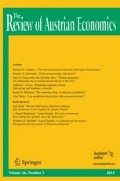Abstract
This article explores certain aspects of James Buchanan’s struggles, over a period of years, to come to grips with Austrian subjectivism in economic theory.
Similar content being viewed by others
Notes
An example: “Mises and his followers have been too prone to accept the splendid isolation of arrogant eccentrics, to divorce their teaching too sharply from mainstream interests, and too eager to launch into polemic: epistemological, methodological, ideological” (Buchanan 1973, p.11).
See, for example, Buchanan (1982), p. 18.
“Most of us want to retain, and rightly so, positive and predictive content in the discipline, to hold fast to genuine ‘science’ that seems possible”. (Buchanan 1973, p. 16).
See especially Buchanan (1982) passim.
I believe that it is to this that Karen Vaughn (in her incisive “Comment: on Buchanan’s 1982 paper” [Vaughn, (1982)]) was referring when she reports (Buchanan 1982, p. 28) that she had told Buchanan that she believed his position had significantly shifted, in this ‘82 paper, from his earlier position. Although Vaughn writes that she did appreciate what she meant when he denied any such shift, she does not explain how this denial can be sustained. Our text here is consistent with Vaughn’s initial reading of Buchanan’s ‘82 paper.
See Karen Vaughn’s perspective critique of these observations of Buchanan, [Vaughn, (1982) pp. 23–27].
Hayek articulated his disagreement, in this regard, in his 1937 paper “Economics and Knowledge” [Hayek (1949), Ch. 2].
An oft-quoted sentence of Hayek’s reads: “and it is probably no exaggeration to say that every important advance in economic theory in the last hundred years was a further step in the consistent application of subjectivism” [Hayek (1955), p. 31]. See also Hayek’s footnote (Hayek (1955), pp. 209–210) in which he cites Mises as the leading and most consistent exponent of the subjectivist perspective.
For an example of what seems the unmistakable influence of Shackle on Buchanan’s work, see Buchanan and Vanburg (1991).
References
Buchanan, J.M. (1969). Cost and Choice: An Inquiry in Economic Theory. Chicago: Markham.
Buchanan, J. M. (1973). Introduction: L. S. E. cost theory in retrospect. In J. M. Buchanan & G. F. Thirlby (Eds.), L. S. E. Essays on Cost. London: London School of Economics and Political Science.
Buchanan, J. M. (1979). What Should Economists Do? Indianapolis: Liberty Press.
Buchanan, J. M. (1982). The Domain of Subjective Economics: Between Predictive Science and Moral Philosophy. In I. M. Kirzner (Ed.), Method, Process, and Austrian Economics: Essays in Honor of Ludwig von Mises. D. C. Heath: Lexington.
Buchanan, J. M., & Vanburg, V. J. (1991). The Market as a Creative Process. Economic Philosophy, 7, 2.
Hayek, F. A. (1949). Economics and Knowledge, Economica, vol. IV (1937). In F. A. Hayek (Ed.), Individualism and Economic Order. London: Routledge and Kegan Paul.
Hayek, F. A. (1955). The Counter-Revolution of Science: Studies on the Abuse of Reason. London: Collier-Macmillan.
Robbins, L. (1932). An Essay on the Nature and Significance of Economic Science. London: Macmillan.
Vaughn, K. I. (1982). Subjectivism, Predictability, and Creativity: Comment on Buchanan. In I. M. Kirzner (Ed.), Method, Process, and Austrian Economics: Essays in Honor of Ludwig von Mises. D. C. Heath: Lexington.
Author information
Authors and Affiliations
Corresponding author
Rights and permissions
About this article
Cite this article
Kirzner, I.M. Buchanan and the Austrians: A tale of two bridges. Rev Austrian Econ 27, 119–128 (2014). https://doi.org/10.1007/s11138-014-0257-9
Published:
Issue Date:
DOI: https://doi.org/10.1007/s11138-014-0257-9



